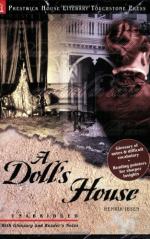|
|
A Doll's House Topic Tracking: Money
Money 1: Torvald expresses his frustration with Nora over her shopping and spending habits. She goes through money entirely too quickly, rendering the family a team of spendthrifts. Nora continues to ask for money, despite Torvald's warning that he has not yet begun his new job that pays a larger salary. Nora is thrilled to have her husband earn more money than he used to, so that she can spend as freely as she desires.
Money 2: Nora continues to ask for money, much to Torvald's dismay. He tells her that he is worried that she inherited some bad (financial and scrupulous) traits from her father. He also treats her as a pet and a doll, as if she is extremely costly to have around. He loves buying her things, but knows that he cannot always afford to do so at her high and expensive taste.
Money 3: Nora cannot contain her excitement at the prospect have having more spare money. She gloats to her friend about Torvald's promotion at the Savings' Bank - a center of finance and money - and how she will now have enough money to do what she wants all the time. Nora also expresses her frustration over how much money the Helmers spent while away in Italy.
Money 4: Mrs. Linde explains to Nora why she married her late husband. It was solely because of money. He offered her security, and at that time, she desperately needed a large source of money, for her mother was ill and she had to take care of her two younger brothers. However, his finances soon depreciated and he died penniless and poor, leaving her the same.
Money 5: Nora discusses her methods of financing the trip to Italy on her own. She borrowed money from creditors and worked a bit to pay it back. She is in constant fear of her husband discovering her secret business past, and always buys the cheapest clothing and accessories, so that she may continue to pay back her loan.
Money 6: Money is not the only thing that Krogstad is after. Nora begs him to stay quiet and not tell Torvald about the loan. However, Krogstad no longer simply wants his money back. He wants to become the right-hand man at the bank and eventually take over Torvald's job. Money, and consequently power, are the motivating forces behind Krogstad's actions.
Money 7: Kristina explains to Krogstad that she left him solely to marry her husband for money. She desperately needed it at that time for her mother and brothers and did not want to break up with him. She had to do it. Money dictated her actions, as it continues to do for so many people.
Money 8: When Torvald is excused from his wife's loan and bond, he is overjoyed! The problems that the money-loan could have caused him, cost him more than a temper. They cost him his wife and his regular lifestyle.
Money 9: Nora excuses Torvald from all financial duties he owes her as her husband. When she walks out the door, she walks away from his new large salary, comfortable home, and convenient servants. She looks forward to developing independence and her own method of making money.




